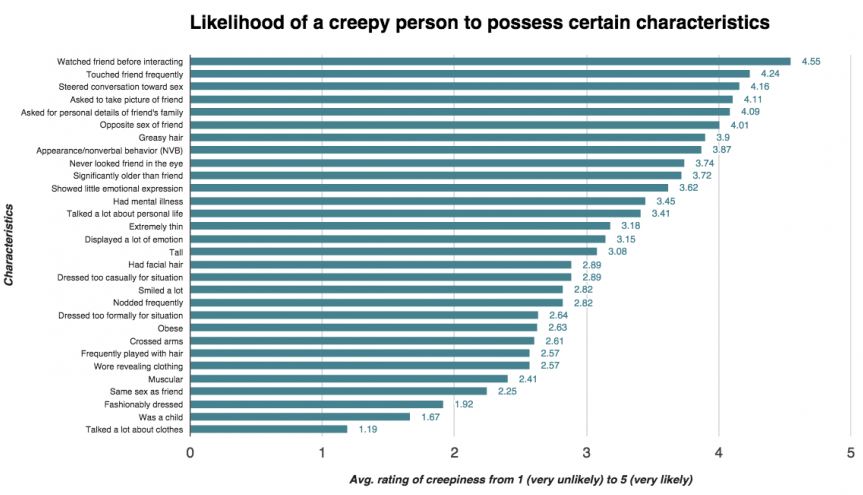Science Explains Why Certain People Creep You Out

By:
The next time someone creeps you out, remember: there might be a sociological reason you feel that way. A new study, currently under review, looked at the nature of creepiness and found that people generally find the same characteristics and behaviors to be creepy.
After surveying more than 1,300 people between the ages of 18 and 77, Knox College social psychologist Francis McAndrew determined that getting the creeps is a "universal human response" that developed as a defense mechanism against ambiguous threats — specifically, violent threats, sexual threats, or "anything that would make you unsure of what the person would do next," McAndrew told Business Insider.
The survey participants were given hypothetical situations in which a friend encounters a creepy person; they were then asked to rate the likeliness that said creepy person had certain physical and behavioral traits on a scale of one ("very unlikely") to five ("very likely"). For example, did this hypothetical creep have greasy hair or watch your friend from a distance before approaching them?
According to the results, people are largely consistent in their perception of creepiness. Watching someone from a distance, frequently touching someone, and steering conversations toward sex are the top behavioral indicators of a creeper. As far as physical qualities are concerned, greasy hair, being tall and extremely thin, and showing little emotional expression all registered as creepy.
 Business Insider - businessinsider.com
Business Insider - businessinsider.com
"McAndrew also learned that 95 percent of survey participants thought creeps were more likely to be male than female—a perception that was equally held by both male and female survey respondents," Business Insider reported. "Women were also more likely to perceive a sexual threat from people they deemed creepy."
There's more research to be done on the subject of creepiness, sociologists say. McAndrew's study revealed patterns in our thinking about what qualifies as creepy, but it didn't include information on how different races or ethnicities perceived creepy people, for example. It did, however, look at the types of occupations participants associated with creepiness.
Clowns, taxidermists, sex shop owners, and funeral directors were ranked among the creepiest of professions, supporting McAndrew's hypothesis that people who work in fields that involve "threatening stimuli" such as death and sex would be considered especially creepy.
"While they may not be overtly threatening, individuals who display unusual nonverbal behaviors, odd emotional behavior, or highly distinctive physical characteristics are outside of the norm, and by definition unpredictable," McAndrew concluded. "This activates our 'creepiness detector' and increases our vigilance as we try to discern if there is in fact something to fear or not from the person in question.
